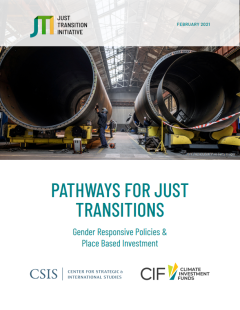
Governments, labour groups, investors, civil society and environmental organizations are increasingly using the principles of just transitions to address the social implications of climate policy and ensure that workers and communities are supported and empowered through these changes.
Given the urgency of the climate challenge and the need to address important questions of justice and equity, it is essential to make the tools and strategies for just transitions more accessible and relevant to policymakers.
This paper summarizes several policy objectives and tools, as well as cross-cutting enablers, that can support socially inclusive processes and equitable distribution of the risks and benefits associated with transitions. It explores these elements by examining two essential aspects of just transition policies: gender-responsive policies and place-based investment.
